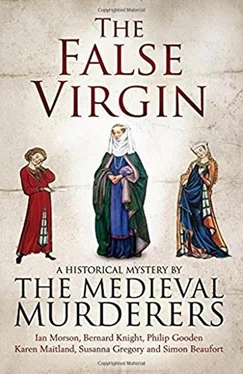Geoffrey Chaucer remained at Bermondsey Priory for another ten days, enjoying the hospitality of the prior and the ordered shape of the life there. He wrote and he read and he talked with the prior and with the aged librarian. Brother Peter. When he left, it was with his work about St Beornwyn revised, rewritten and completed. He handed the original manuscript back to Richard Dunton, thanking him for telling him the story of the saint’s life in the first place. Dunton was pleased. Chaucer didn’t spoil his mood by telling him he might not be quite so glad when he eventually read the piece for it cast a not altogether complimentary light on Beornwyn.
Geoffrey returned to his lodgings in Aldgate, and greeted Joan, the woman who cooked and kept the place for him in the absence of his wife (and his wife was almost always absent). She was a good housekeeper who tended to treat his presence as an intrusion. She looked more like a grandmother than a mother but had a young son, called Thomas, whom Geoffrey was teaching to read, in a fitful way. The boy was about eight, younger than Chaucer’s own son, also called Thomas, and he was useful round the Aldgate lodgings. Once Geoffrey had attended to some customs business, he visited a copier near St Paul’s and arranged for three copies to be made of the Beornwyn poem. Two of these he would give to the more discriminating members of the Savoy Palace household. At a later date, if invited, he would recite the poem to an audience, a select one.
As it happened he’d been reminded of the Savoy Palace even before crossing the bridge back into the city. Leaving Bermondsey Priory on foot, Chaucer stopped off at the Tabard Inn. This was one of his bolt holes in Southwark, not so respectable as the priory, of course, but more reputable than some of the commercial establishments further west along the river, among which were many brothels. In fact, the host of the Tabard, Harry Bailey, was making efforts to attract a better class of customer, for example by purchasing higher quality wines. This particular location in Southwark, on the main road leading towards the southeast, was a natural gathering-place for those intending to start on the pilgrimage to the shrine of Thomas Becket in Canterbury. Chaucer thought he could identify a few pilgrims assembling here now, quite early on this spring morning. It was not only their travelling clothes but their expressions, somewhere between excited and smug, which gave them away.
Harry Bailey was pleased to see Geoffrey. The host was an ample, cheerful figure, naturally interested in his customers and not only for the sake of business they bought. He recommended his Rhenish – ‘New in yesterday, sir. Go down to the cellar and see the markings on the barrel for yourself’ – but Geoffrey apologetically explained that he’d had enough of good wine while at Bermondsey and ordered honest ale instead. He went to sit in a corner and watch the world go by. He was amusing himself by guessing at the professions and trades of the pilgrims gathering in a group at one end of the room when his attention was caught by a penetrating voice from closer by. He turned to look. Not all of Harry Bailey’s guests were of the pious pilgrim type, and the cluster of men crowding round a neighbouring table were what you might call old Southwark.
‘He is a changeling, I tell you! His filthy riches stink to high heaven. His white house is finer than the King’s! And his new duchess is a foreign bitch who cannot even wrap her tongue round God’s good English.’
The speaker was a man with a stubbly scalp, which showed beneath an undersized red cap. His drink sat neglected on the table in front of him as he used his right forefinger to tick off his accusations on the fingers of his left hand. The other four individuals round the table said nothing but nodded or remained still. They were sitting back slightly as if wary of these fierce words, and so giving Geoffrey a clear view.
‘How much longer must we bear this tyrant? How many more insults must we endure from the very existence of the traitor? How often will we be forced to bow the knee before this whoreson prince?’
Now the speaker was using his fist to thump on the table, emphasising each angry question. Geoffrey sighed. He glanced across at Harry Bailey but the Tabard host was busy chatting to a couple of the pilgrims. Chaucer did not think Bailey would appreciate the kind of talk coming from the next table. He didn’t appreciate it himself. Had it been overheard by someone with real authority and the desire to exercise it, then the speaker could have found himself in serious trouble. For the subject of the man’s rant was John of Gaunt, the Duke of Lancaster. The references to his great wealth, to the white house that was finer than the King’s, to his foreign wife, made it clear enough. In addition, there was the mention of John being a changeling. This was a rumour, lately creeping about London, to the effect that thirty-five years previously, Queen Philippa, the wife of Edward III, had given birth to an unfortunate girl which, like a sow, she had overlain and suffocated. Terrified of telling the truth to her royal husband, she substituted a baby boy for the girl child. To compound the insult, it was said that the boy was the son of a labourer from Ghent.
Wearily, Geoffrey Chaucer got to his feet. He moved the short distance to the table where red-cap sat among his companions. It looked as though he was about to launch on another string of insults and rhetorical demands.
Chaucer, clutching his drink, said mildly: ‘Excuse me, but I couldn’t help hearing what you were saying.’
The man with the little red cap looked up in surprise. The others round the table instinctively shifted further away on their stools, trying to dissociate themselves from their friend.
‘So what if you did hear?’
‘I have news for you,’ said Chaucer. ‘That story you were telling about John of Gaunt being a changeling…’ He noticed the expressions on the faces of the men. Now they were really worried.
‘Well, that is what he is,’ said the speaker, although his tone was a little less certain. ‘What is your news?’
‘Gaunt is no changeling but he is something stranger, much stranger.’
All the time Geoffrey was speaking low, as though imparting a secret. Then he leaned forward and placed his wooden mug on the table, allowing the curiosity of the men to build up, making himself part of the group. When he judged the moment was right, he said: ‘Much stranger, I say again. I have it on good authority that the Duke of Lancaster is the offspring of a dragon and a mermaid. Furthermore, he was conceived during a thunderstorm.’
‘Authority? Whose authority?’ said the one who’d claimed Gaunt was a changeling.
‘I have sources inside the Savoy Palace at the very highest level,’ said Geoffrey. ‘I will take an oath on that.’
‘Is it true? Is Lancaster really the child of a dragon and a mermaid?’
The speaker was another young man at the table. His voice was naturally high, not only with surprise at what he was hearing. His words caught the attention of a tall, lanky fellow who was passing and who stopped for a moment to listen.
‘Yes, it is as true as I’m standing here,’ said Geoffrey, thinking that there was a kind of truth to what he was saying, the same sort of truth as in the story of Beornwyn. He could see that his quiet confidence was having an effect, not so much on the original speaker as on the others, including the tall man who was still hesitating nearby. Their glances flickered towards the red-capped man, who said: ‘It’s absurd! How would a dragon and a mermaid have congress?’
Chaucer raised his eyebrows slightly as if the question itself were absurd. ‘By asking that, you betray the limits of your understanding, my friend. The laws that apply to mere mortals do not apply to the gods – or to dragons and mermaids. No more than they apply to basilisks, griffins or unicorns. Only an ignorant individual would think otherwise.’
Читать дальше












